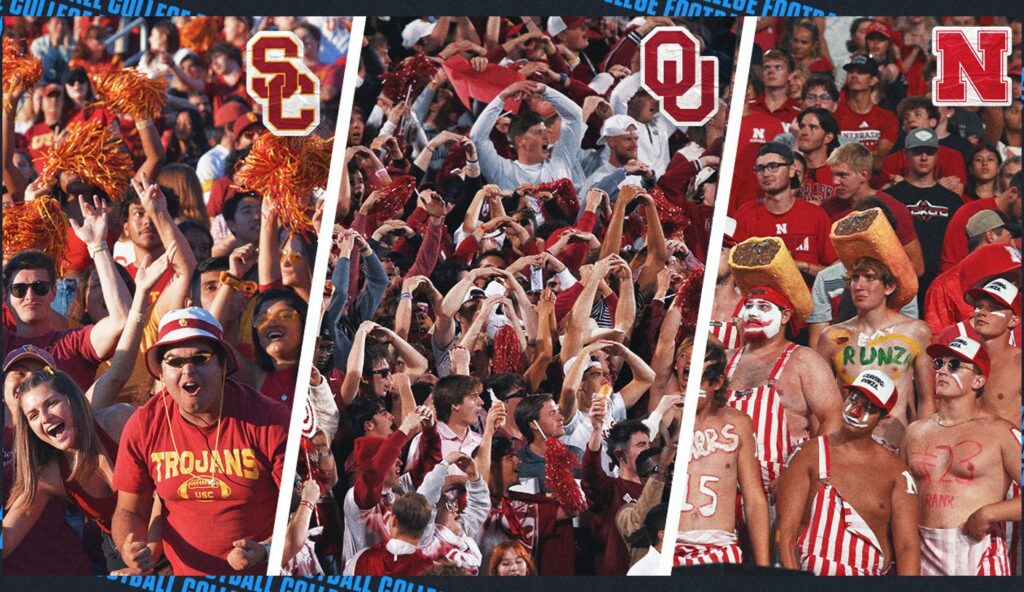RJ Young
FOX Sports National College Football Analyst
The impact of conference realignment over the past 15 years could easily fill several volumes of Encyclopedia Britannica. But as college football continues to evolve at a rapid pace, some of the sport’s most recognizable programs are showing signs of strain after switching leagues.
Since the early 1970s, Oklahoma, USC, Alabama, Ohio State and Nebraska have been standard-bearers for excellence in the sport. The three that have changed conferences since 2011 — Oklahoma, USC and Nebraska — have struggled to regain their footing since making the move.
Neither USC nor Nebraska appeared in this season’s AP Top 25 or Coaches Poll. Oklahoma was ranked No. 18 in Monday’s AP preseason poll (No. 10 in my “Ultimate 136”) but was left out of the Coaches Poll for the first time since 1999. That means 62 FBS coaches came to the conclusion that none of these blue-blood programs are among the 25 best — something that would have felt unthinkable just 15 years ago.
[Check out RJ Young’s Ultimate 136 College Football Rankings here]
Since 1950, Alabama has won 14 (claimed) national titles and seen four players win the Heisman Memorial Trophy; USC has won seven national titles and been home to eight Heisman winners; Ohio State has won eight national titles, produced six Heisman winners, and is home to the only two-time Heisman winner in the history of the sport; Nebraska has won five national titles and counts three Heisman winners.
Two of those programs — Ohio State and Alabama—have remained members of their respective leagues, the Big Ten and SEC, for over a century. And their decision not to change conferences or even venture toward independence has paid dividends in this new era of college football where we’ve seen the collapse of the Pac-12 Conference, the expansion of the Big Ten, SEC, ACC and Big 12, and 49 programs changing their conference allegiance.
Nebraska’s move to the Big Ten hasn’t lived up to Huskers fans’ standards, with just one 10-win season and eight losing seasons as a conference member. It’s a stark contrast from the Huskers’ Big 8 and Big 12 years, where, when paired with Oklahoma in the same league, Nebraska could be counted on to win at least nine games and a national title every eight years from 1962 to 2002.
USC’s first season in the Big Ten began with it ranked inside the top 25 and ended with a rather deflating 7-6 record. While the program had been slipping — everything is downhill when you win 11 or more games for six straight years from 2002 to 2008 and two national titles — not enough media members or coaches believe Lincoln Riley has done enough to warrant inclusion into the preseason top 25.
Oklahoma’s first season in the SEC began with it ranked inside the top 20 and ended with just the second losing season in Norman since 1998. What’s more is, the Sooners have won 10 or more games 18 times from 2000 to 2021. For Brent Venables, who is responsible for the only two losing seasons Oklahoma has suffered in the 21st century, this season could not be more important.
If Oklahoma in the SEC feels a lot like Lewis Hamilton’s move from Mercedes to Ferrari, that’s because it is. Both can’t figure out how to win in the new digs, and both are searching for an identity that was once as sturdy as a 1,0000-year-old tree.
Among the three aforementioned teams, Oklahoma is not only the program with the biggest target on its back, but also the one with the toughest schedule: No. 1 Texas, No. 8 Alabama, No. 9 LSU, No. 13 South Carolina, No. 14 Michigan, No. 21 Ole Miss and No. 24 Tennessee are lined up and ready to pour it all on OU.
When the Sooners announced their move to the SEC, most Oklahoma fans celebrated. The athletic department even threw an “SEC Day” to commemorate the move because, well, the grass must just be greener in the SEC. It turns out that even if it’s green — mo’ money, mo’ money, mo’ — it still has to get cut. And, so far, Oklahoma can’t get it done.
Nebraska, a program that reached its first bowl game in eight years last season, the longest bowl brought in program history, is also trying to climb back up the mountain it once ruled with a fan base as rabid and switched on as any. Rather than learn from Nebraska, Oklahoma and USC might come to find out they should’ve paid closer attention.
Know your roots. Respect them. And if you cut them off, don’t be surprised if you start to fall.
RJ Young is a national college football writer and analyst for FOX Sports. Follow him at @RJ_Young.
recommended
Get more from the College Football Follow your favorites to get information about games, news and more
Read the full article here

